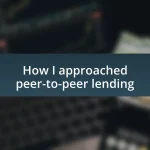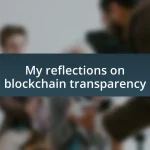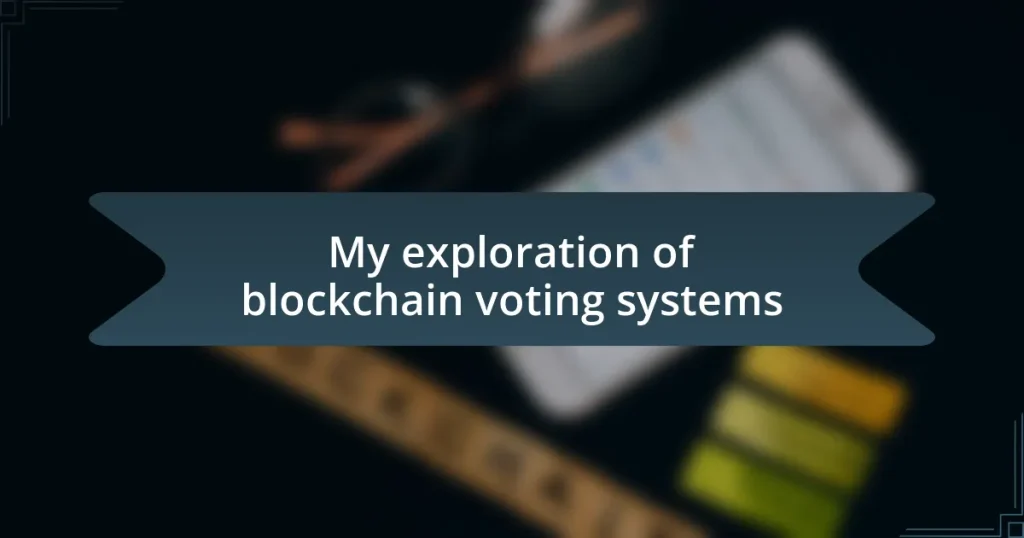Key takeaways:
- Blockchain technology offers a decentralized and immutable voting system that enhances security, transparency, and voter engagement.
- Secure voting is essential for democracy, as it builds public trust, prevents fraud, and encourages voter participation.
- Challenges to blockchain voting include cybersecurity risks, equitable access to technology, and the need for voter education on the new system.
- Case studies, such as those in Utah County, Zug, and Estonia, demonstrate the potential for blockchain to modernize voting processes and enhance civic engagement.
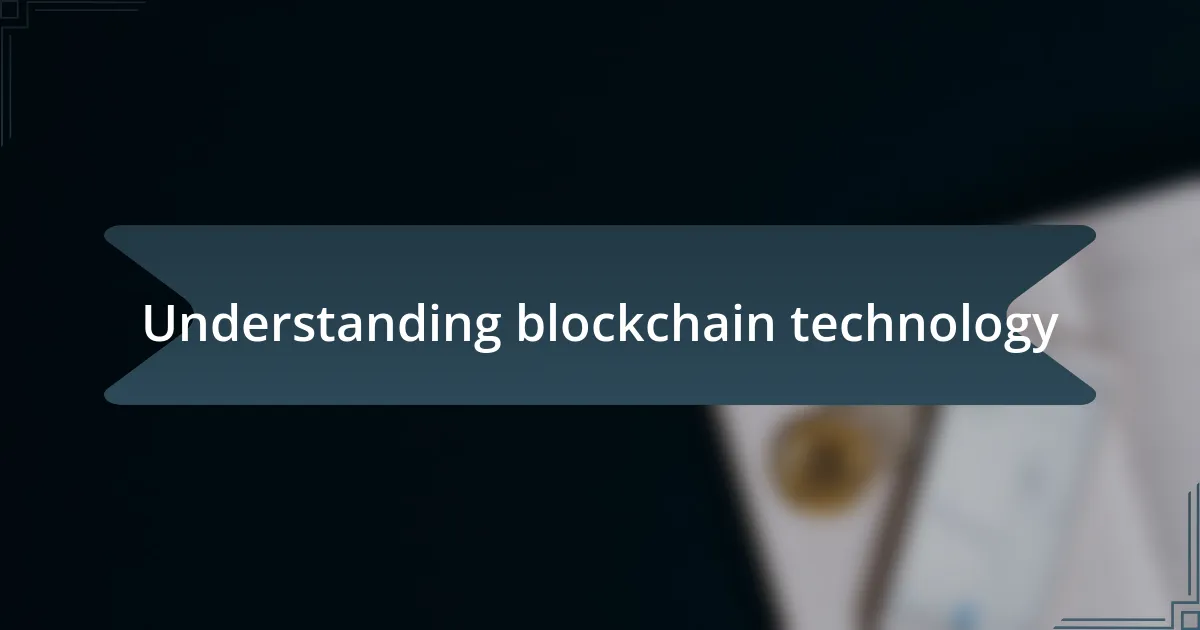
Understanding blockchain technology
Blockchain technology is a decentralized digital ledger that records transactions across many computers in such a way that the registered transactions cannot be altered retroactively. I remember my first encounter with blockchain during a tech meetup; it felt revolutionary. The idea that each block of data is linked in a chain and secured by cryptography sparked a deep interest in me—how could something so transparent ensure security and trust?
What truly fascinates me about blockchain is its ability to empower individuals. Unlike traditional systems, where a central authority holds power, blockchain distributes that authority among all participants. This shift is both thrilling and a bit daunting; it raises questions like, “What would our world look like if more systems operated this way?” Could we see increased accountability and reduced corruption?
I’ve spent time reflecting on how the immutable nature of blockchain—where once data is added, it can’t be changed—could enhance everything from supply chains to voting systems. I can almost envision a future where individuals feel more confident in the processes that govern them. It’s a powerful thought; our votes and identities would be secured and validated in a way that traditional systems often struggle to achieve.
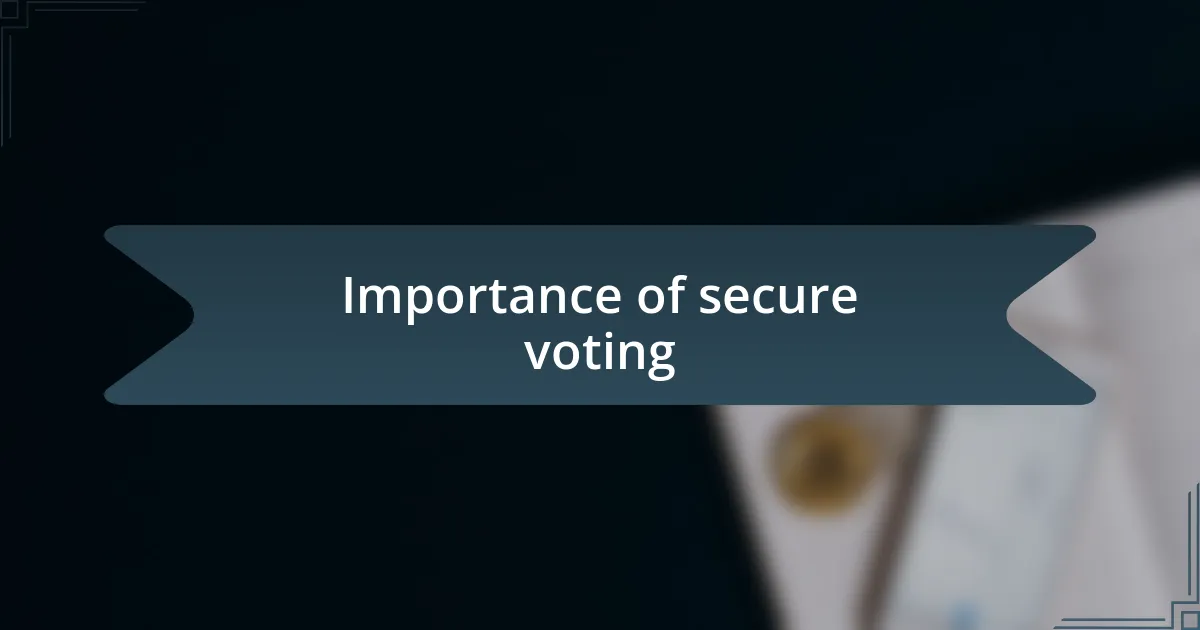
Importance of secure voting
Secure voting is crucial for a functioning democracy. I recall the unease I felt during election season when doubts arose about the legitimacy of the polling process. With election integrity at stake, we must ensure that every vote cast is a true reflection of the will of the people, and any weaknesses in the system can undermine public trust. Here are some compelling reasons why secure voting is essential:
- Public Trust: Voters must believe that their votes are counted accurately to maintain confidence in the democratic process.
- Prevention of Fraud: A secure voting system minimizes the risks of manipulation or unauthorized access, safeguarding the electoral outcome.
- Voter Empowerment: When individuals know their votes are protected, they are more likely to participate actively in elections, strengthening democracy.
Looking back, I often think about how many citizens avoid voting due to fears of fraud or mismanagement. I remember discussing this with friends who chose not to participate, voicing concerns about their votes being mishandled. This feeling of insecurity not only diminishes turnout but can also skew election results. A secure voting mechanism, especially one utilizing blockchain, could resolve these fears by providing transparency and accountability.
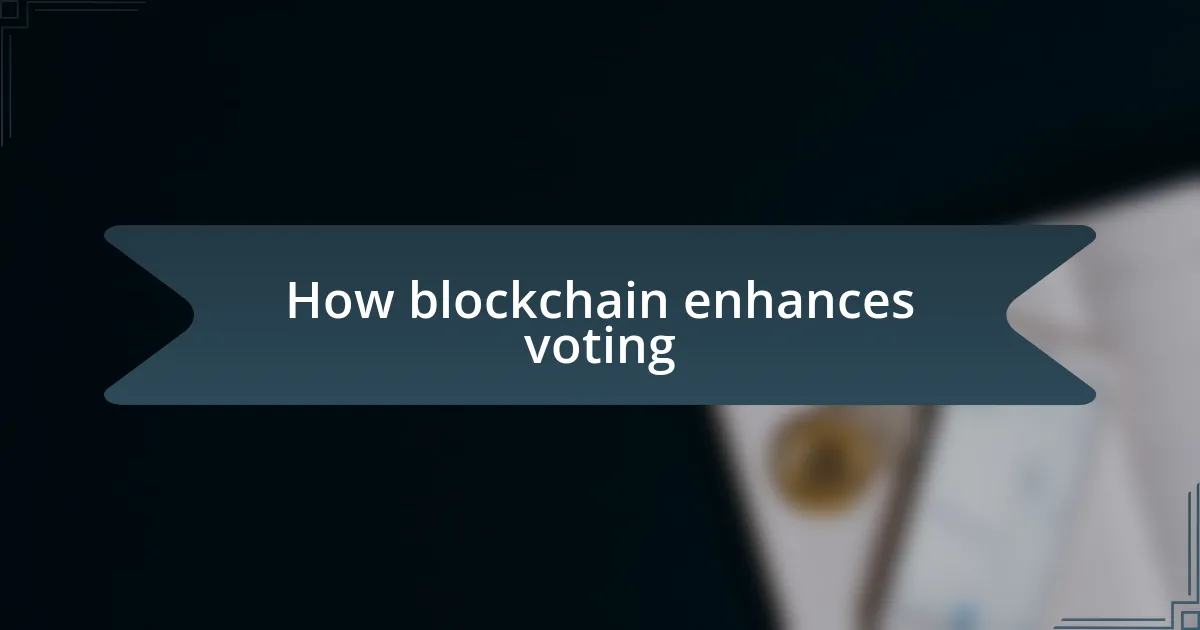
How blockchain enhances voting
Blockchain technology brings a remarkable shift to the voting landscape by offering unparalleled transparency. The way transactions are recorded on a blockchain creates an unalterable chain of data. I remember the excitement I felt when learning how each vote is treated as a unique transaction that, once verified, cannot be modified or deleted. This immutability greatly reduces the chances of tampering, which is a fear many voters, including myself, have experienced throughout various electoral cycles.
Moreover, the decentralized nature of blockchain enhances security significantly. Unlike traditional voting systems that rely on a central authority, a blockchain network spreads information across various nodes. This means that there is no single point of failure. I recall a conversation I had with a tech-savvy friend who expressed how comforting it would be to know that our votes were safeguarded by a system resistant to hacks or manipulation. Their viewpoints resonated with my own concerns about the increasing instances of cyber threats in our digital age.
Finally, the accessibility that blockchain provides is promising for voter engagement. By allowing remote voting through a secure platform, individuals who may struggle to reach polling places can participate more easily. I remember when a family member who was elderly and unable to travel felt disheartened about missing an election. Imagining a blockchain-based system that could empower her to vote from home filled me with hope. Such advancements could lead to higher turnout rates and a more representative democracy.
| Aspect | Traditional Voting | Blockchain Voting |
|---|---|---|
| Security | Centralized, vulnerable to tampering | Decentralized, immutable, and secure |
| Transparency | Limited visibility into counting process | Full visibility with public ledgers |
| Accessibility | Physical polling required | Remote voting capabilities |
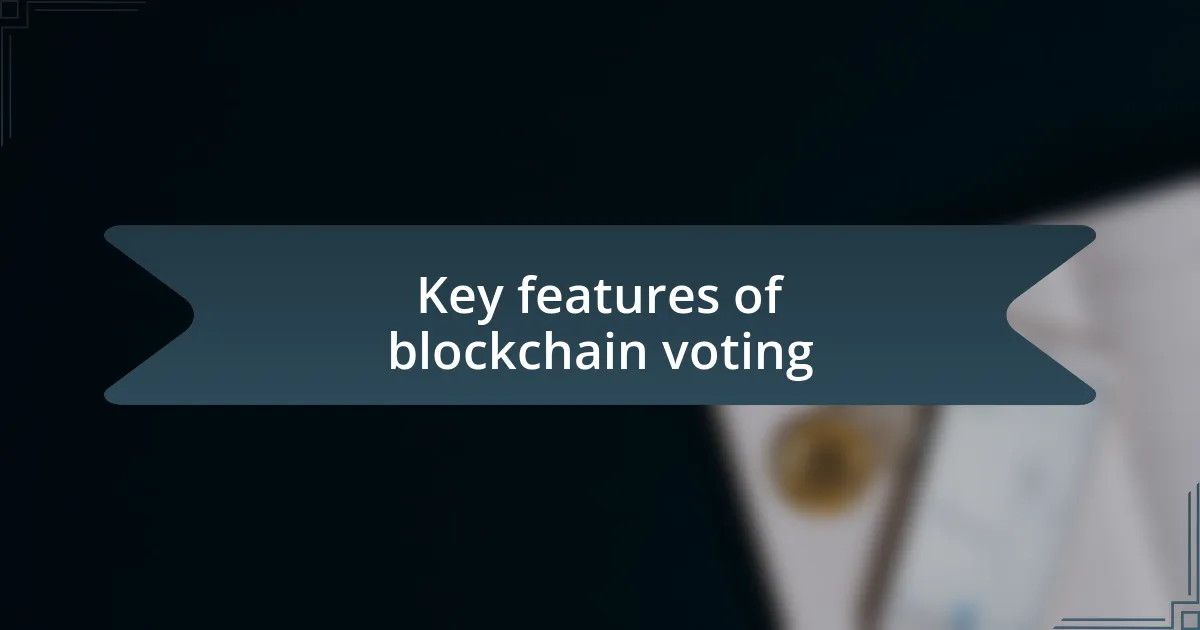
Key features of blockchain voting
The key features of blockchain voting are truly transformative, and I find the idea of an immutable voting record particularly compelling. Each vote, once cast, is logged onto the blockchain, creating a permanent record that prevents any alteration. Reflecting on this, I can’t help but think about the peace of mind it offers. Wouldn’t it be reassuring to know your vote is etched in digital stone, free from the possibility of reassessment or erasure?
Another critical aspect is the decentralization inherent to blockchain technology. Unlike traditional systems, where a singular entity manages the entire voting process, blockchain disperses data across multiple nodes. I often recall discussing this with a colleague who was skeptical about the reliability of technology in elections. When I explained how decentralization removes any single point of failure, I saw a light of understanding in their eyes. Could this decentralized approach become the backbone of future elections, ensuring that no malicious party can compromise the integrity of the vote?
Lastly, the accessibility boost that blockchain facilitates is nothing short of revolutionary. I vividly remember a friend who moved abroad for work and was frustrated about missing voting opportunities during elections back home. Envisioning a blockchain-based system that allows her to vote securely from afar makes me hopeful. Isn’t it incredible to consider how such systems might welcome many voices into the democratic process, making it more inclusive than ever before?
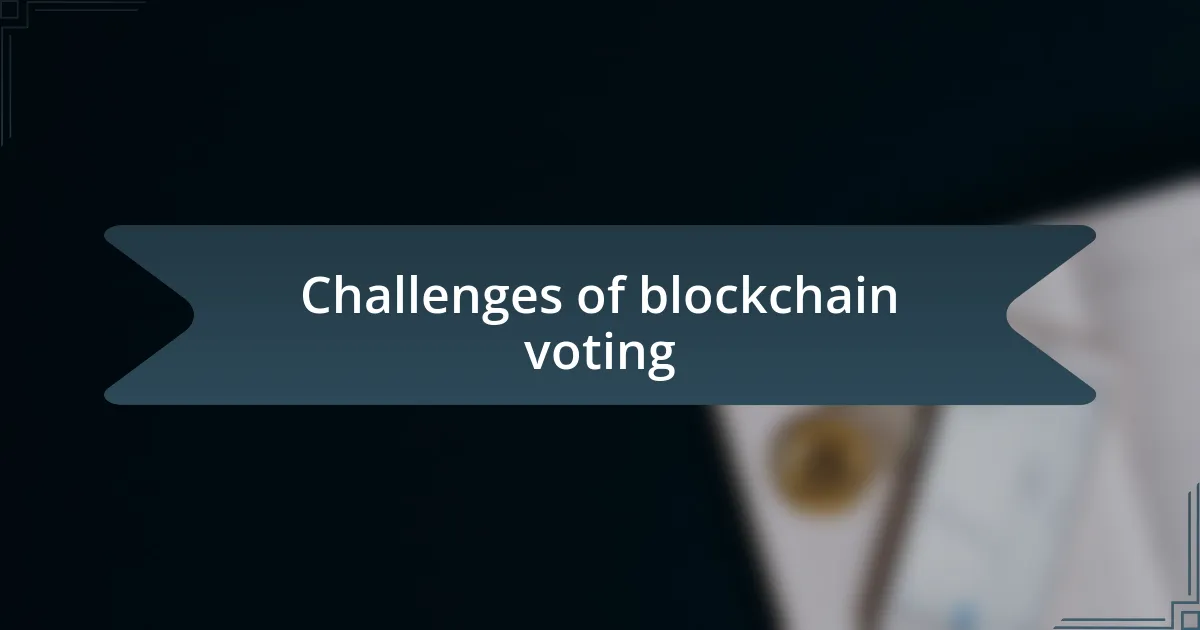
Challenges of blockchain voting
There are several challenges that come with implementing blockchain voting systems which often lead to skepticism about their security and reliability. One significant concern is the risk of cybersecurity threats. I remember attending a conference where the speakers highlighted how hackers have become increasingly sophisticated. This made me wonder – if our financial institutions are vulnerable, how can we confidently ensure that a voting system isn’t also susceptible to breaches?
Another major hurdle is ensuring equitable access to technology. During a conversation with an acquaintance who lives in a rural area, they expressed worries about not having the same technological infrastructure as those in urban settings. It struck me deeply how critical it is for every citizen to have equal opportunity to participate in elections. If access is skewed, won’t that undermine the very essence of democracy?
Lastly, the complexity of educating voters about blockchain technology cannot be underestimated. I recall a family gathering where I tried to explain blockchain to my relatives, only to find a mix of confusion and skepticism in their eyes. “Why can’t we just stick to the traditional methods?” one of them asked. This made me reflect on the importance of not only developing robust technology but also fostering public understanding. How can we expect people to trust a new system if they don’t fully grasp how it works?
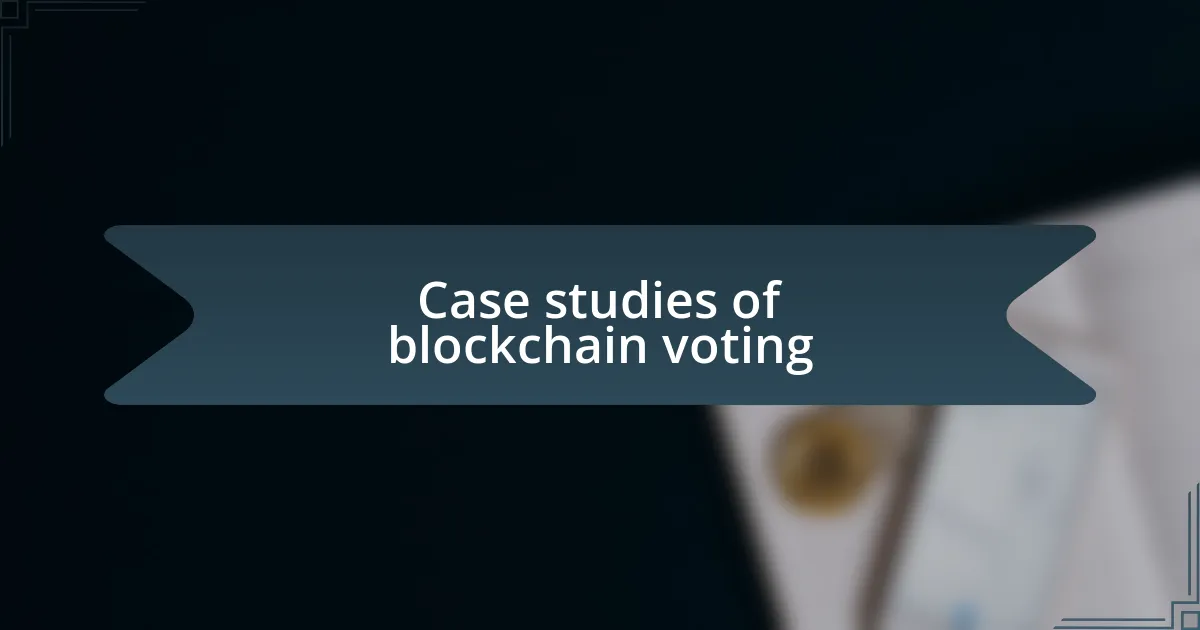
Case studies of blockchain voting
One notable case study is the 2020 Utah County election, which utilized a blockchain voting pilot program. I remember watching news reports detailing how this initiative aimed to enhance security and transparency. The officials emphasized that voters felt more confident knowing their votes were permanently recorded on a blockchain, igniting a discussion about how technology could revitalize trust in the system.
In another instance, the city of Zug in Switzerland, often referred to as “Crypto Valley,” implemented blockchain voting for its local elections. I was fascinated to read how residents could cast their votes using a secure mobile application, making participation easier, especially for those with busy schedules. This raised an important question in my mind: Could this model serve as a blueprint for other municipalities striving to modernize their voting processes?
Furthermore, Estonia has been a trailblazer in blockchain voting since 2019, enabling citizens to vote online securely. I recall thinking about the implications when learning how this not only streamlined the voting process but also actively encouraged civic engagement among younger generations. It left me pondering: Does blockchain voting merely represent a technological shift, or could it signify a vital transformation in how we engage with democracy itself?
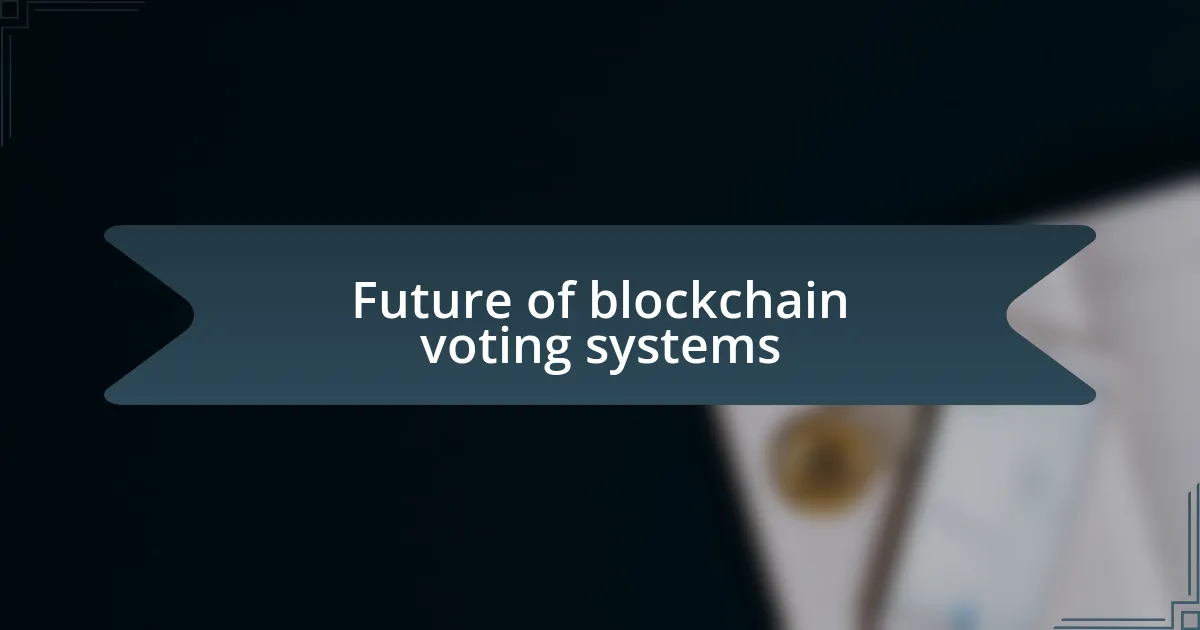
Future of blockchain voting systems
Looking ahead, the future of blockchain voting systems is both promising and complex. I can’t help but feel a sense of excitement when I think about how these systems could enhance voter accessibility. Imagine the day when someone can cast their vote from anywhere in the world with just a few taps on their phone. Wouldn’t that be a game-changer for people living abroad or those with mobility issues?
As I explore different projections for blockchain voting, I realize that privacy and security will be paramount. It’s fascinating to consider how innovations in cryptography, which are foundational to blockchain, can evolve to protect voter identities and ballots even further. If we can ensure absolute anonymity while still maintaining transparency, wouldn’t that be the ideal balance for democratic processes?
However, embedding blockchain within the voting infrastructure will likely require overcoming significant regulatory and legislative hurdles. Reflecting on my experiences with technological shifts in other sectors, I recognize how essential it is to engage all stakeholders—from government officials to voters—in dialogue about these changes. So, how do we ensure that every voice is heard in this transition? It might just be through community forums that utilize these very technologies to foster discussions, making blockchain not just a tool, but a catalyst for civic engagement.

